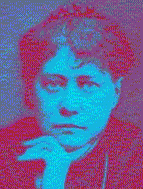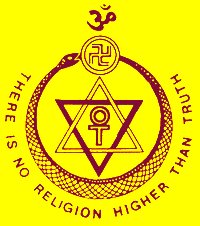The Key to Theosophy

Helena
Petrovna Blavatsky
1831
-1891
_______________________
The Key to Theosophy
By
Helena Petrovna Blavatsky
Why is Theosophy Accepted?
Q. I understand to a certain extent; but I see that your teachings
are far more
complicated and metaphysical than either Spiritualism or current
religious
thought. Can you tell me, then, what has caused this system of
Theosophy which you support to arouse so much interest and so much animosity at
the same time?
A. There are several reasons for it, I believe; among other causes
that may be
mentioned is:
1. The great reaction from the crassly materialistic theories now
prevalent
among scientific teachers.
2. General dissatisfaction with the artificial theology of the
various Christian
Churches, and the number of daily increasing and conflicting sects.
3. An ever-growing perception of the fact that the creeds which are
so obviously
self-and mutually-contradictory cannot be true, and that claims
which are
unverified cannot be real. This natural distrust of conventional
religions is
only strengthened by their complete failure to preserve morals and
to purify
society and the masses.
4. A conviction on the part of many, and knowledge by a few, that
there must be
somewhere a philosophical and religious system which shall be
scientific and not
merely speculative.
5. A belief, perhaps, that such a system must be sought for in
teachings far
antedating any modern faith.
Q. But how did this system come to be put forward just now?
A. Just because the time was found to be ripe, which fact is shown
by the
determined effort of so many earnest students to reach the truth,
at whatever
cost and wherever it may be concealed. Seeing this, its custodians
permitted
that some portions at least of that truth should be proclaimed. Had
the
formation of the Theosophical Society been postponed a few years
longer, one
half of the civilized nations would have become by this time rank
materialists,
and the other half anthropomorphists and phenomenalists.
Q. Are we to regard Theosophy in any way as a revelation?
A. In no way whatever-not even in the sense of a new and direct
disclosure from
some higher, supernatural, or, at least, superhuman beings; but
only in the
sense of an "unveiling" of old, very old, truths to minds
hitherto ignorant of
them, ignorant even of the existence and preservation of any such
archaic
knowledge.
It has become "fashionable," especially of late, to
deride the notion that there
ever was, in the mysteries of great and civilized peoples, such as
the
Egyptians, Greeks, or Romans, anything but priestly imposture. Even
the
Rosicrucians were no better than half lunatics, half knaves. Numerous
books have been written on them; and tyros, who had hardly heard the name a few
years before, sallied out as profound critics and Gnostics on the subject of
alchemy, the fire-philosophers, and mysticism in general. Yet a long series of
the
Hierophants of
greatest philosophers and sages of
the designation of wisdom and divine science all knowledge, for
they considered
the base and origin of every art and science as essentially divine.
Plato
regarded the mysteries as most sacred, and Clemens Alexandrinus,
who had been himself initiated into the Eleusinian mysteries, has declared
"that the
doctrines taught therein contained in them the end of all human
knowledge." Were Plato and Clemens two knaves or two fools, we wonder,
or-both?
Q. You spoke of "Persecution." If truth is as represented
by Theosophy, why has it met with such opposition, and with no general
acceptance?
A. For many and various reasons again, one of which is the hatred
felt by men
for "innovations," as they call them. Selfishness is
essentially conservative,
and hates being disturbed. It prefers an easy-going, unexacting lie
to the
greatest truth, if the latter requires the sacrifice of one's
smallest comfort.
The power of mental inertia is great in anything that does not
promise immediate
benefit and reward. Our age is preeminently unspiritual and matter
of fact.
Moreover, there is the unfamiliar character of Theosophic teachings;
the highly
abstruse nature of the doctrines, some of which contradict flatly
many of the
human vagaries cherished by sectarians, which have eaten into the
very core of
popular beliefs. If we add to this the personal efforts and great
purity of life
exacted of those who would become the disciples of the inner
circle, and the
very limited class to which an entirely unselfish code appeals, it
will be easy
to perceive the reason why Theosophy is doomed to such slow, uphill
work. It is essentially the philosophy of those who suffer, and have lost all
hope of being
helped out of the mire of life by any other means. Moreover, the
history of any
system of belief or morals, newly introduced into a foreign soil,
shows that its
beginnings were impeded by every obstacle that obscurantism and
selfishness
could suggest. "The crown of the innovator is a crown of
thorns" indeed! No
pulling down of old, worm-eaten buildings can be accomplished
without some
danger.
Q. All this refers rather to the ethics and philosophy of the T.S.
Can you give
me a general idea of the Society itself, its objects and statutes?
A. This was never made secret. Ask, and you shall receive accurate
answers.
Q. But I heard that you were bound by pledges?
A. Only in the Arcane or "Esoteric" Section.
Q. And also, that some members after leaving did not regard
themselves bound by them. Are they right?
A. This shows that their idea of honor is an imperfect one. How can
they be
right? As well said in The Path, our theosophical organ at New
York, treating of
such a case:
Suppose that a soldier is tried for infringement of oath and
discipline, and is
dismissed from the service. In his rage at the justice he has
called down, and
of whose penalties he was distinctly forewarned, the soldier turns
to the enemy
with false information-a spy and traitor-as a revenge upon his
former Chief, and
claims that his punishment has released him from his oath of
loyalty to a cause.
Is he justified, think you? Don't you think he deserves being
called a
dishonorable man, a coward?
Q. I believe so; but some think otherwise.
A. So much the worse for them. But we will talk on this subject
later, if you
please.
The Working System of the T.S. *1)
__________________________

Find answers to more questions
with these Theosophy links
Dave’s
Streetwise Theosophy Boards
The Theosophy Website that
Welcomes Absolute Beginners
If you run a Theosophy Study Group,
please feel free
to make use of the material on this
Website
The Most Basic Theosophy
Website in the Universe
A quick overview of Theosophy
and the Theosophical Society
If you run a Theosophy Study Group you
can use this as an introductory handout.

Cardiff Theosophical Society meetings
are informal
and there’s always a cup of tea afterwards
The
Cardiff Theosophical Society Website
The
National Wales Theosophy Website
This is for
everybody not just people in Wales
Theosophy Cardiff’s Instant Guide
General pages
about Wales, Welsh History
and The History
of Theosophy in Wales
Independent Theosophy Blog
One liners and quick explanations
About aspects of Theosophy
H P Blavatsky is usually the only
Theosophist that most people have
ever
heard of. Let’s put that right
Lentil burgers, a
thousand press ups before breakfast and
the daily 25 mile
run may put it off for a while but death
seems to get most
of us in the end. We are pleased to
present for your
consideration, a definitive work on the
subject by a
Student of Katherine Tingley entitled
An
Independent Theosophical Republic
Links to Free Online Theosophy
Study Resources; Courses, Writings,
No
Aardvarks were harmed in the
The Spiritual Home of Urban Theosophy
The Earth Base for Evolutionary Theosophy
Classic Introductory
Theosophy Text
A Text Book of Theosophy By C
What Theosophy Is From the Absolute to Man
The Formation of a Solar System The Evolution of Life
The Constitution of Man After Death Reincarnation
The Purpose of Life The Planetary Chains
The Result of Theosophical Study
An Outstanding
Introduction to Theosophy
By a student of
Katherine Tingley
Elementary Theosophy Who is the Man? Body and Soul
Body, Soul and Spirit Reincarnation Karma
Preface
Theosophy and the Masters General Principles
The Earth Chain Body and Astral Body Kama – Desire
Manas Of Reincarnation Reincarnation Continued
Karma Kama Loka
Devachan
Cycles
Arguments Supporting Reincarnation
Differentiation Of Species Missing Links
Psychic Laws, Forces, and Phenomena
Psychic Phenomena and Spiritualism
Quick Explanations with Links to More
Detailed Info
What is Theosophy ? Theosophy Defined (More Detail)
Three Fundamental Propositions Key Concepts of Theosophy
Cosmogenesis
Anthropogenesis
Root Races
Karma
Ascended Masters After Death States Reincarnation
The Seven Principles of Man Helena Petrovna Blavatsky
Colonel Henry Steel Olcott William Quan Judge
The Start of the Theosophical Society Theosophical Society Presidents
History of the Theosophical Society Glossaries of Theosophical Terms
History of the Theosophical Society in Wales
The Three Objectives of the Theosophical Society
Explanation of the Theosophical Society Emblem
Karma Fundamental Principles Laws: Natural and Man-Made The Law of Laws
The Eternal Now
Succession
Causation The Laws of Nature A Lesson of The Law
Karma Does Not Crush Apply This Law
Man in The Three Worlds Understand The Truth
Man and His Surroundings The Three Fates
The Pair of Triplets Thought, The Builder
Practical Meditation Will and Desire
The Mastery of Desire Two Other Points
The Third Thread Perfect Justice
Our Environment
Our Kith and Kin Our Nation
The Light for a Good Man Knowledge of Law The Opposing Schools
The More Modern View Self-Examination Out of the Past
Old Friendships
We Grow By Giving Collective Karma Family Karma
National Karma
India’s Karma
National Disasters
Try these if you are looking
for a
local Theosophy Group or Centre
UK Listing of Theosophical Groups